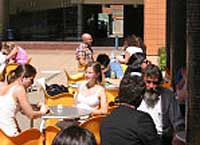Family Law - JURD7491
Faculty: Faculty of Law
School: Faculty of Law
Course Outline: See below
Campus: Kensington Campus
Career: Postgraduate
Units of Credit: 6
EFTSL: 0.12500 (more info)
Indicative Contact Hours per Week: 3
Enrolment Requirements:
Pre-requisite: 36 UOC of JURD courses for students enrolled prior to 2013. For students enrolled after 2013, pre-requisite: 72 UOC of JURD courses.
Excluded: LAWS3391
CSS Contribution Charge: 3 (more info)
Tuition Fee: See Tuition Fee Schedule
Further Information: See Class Timetable
View course information for previous years.
Description
Recommended Prior Knowledge
Course Objectives
- To give a thorough outline of the fundamental principles, processes and institutions involved in federal and state family law
- To develop a critical perspective on the operation and interaction of the various areas of family law, with an awareness of the social and economic context in which family law operates
- To emphasise the relevance of empirical, historical and comparative material (both legal and non-legal) to the analysis and understanding of family law issues
- To develop skills necessary for the formulation of legal advice and argument in family law situations, as well as the provision of practical advice designed to encourage the peaceful resolution of family law disputes
- To develop a sense of the ethical issues, both professional and otherwise, which arise in the family law context
Main Topics
- Perspectives on 'family', historical background, and constitutional aspects
- Marriage and other domestic relationships
- Divorce
- Financial aspects
- Parents and children
- Process in family law
- Domestic violence
- Status of children
Assessment
2 exams (50% each); or
1 exam and research essay (50% each)
Course Texts
Prescribed
There is no prescribed text book for the course. Instead, students will be required to obtain the following volumes of materials from the University Bookshop:
- Introductory Perspectives, Historical Background, Constitutional Aspects, Marriage and Divorce
- Financial Adjustment (Spousal Maintenance, Property Adjustment, Financial Agreements, Non-Marital Relationships, Comment and Reform)
- Parents and Children, Process, Domestic Violence, Status of Children
Recommended
Refer to Course Outline provided by lecturer.
Resources









